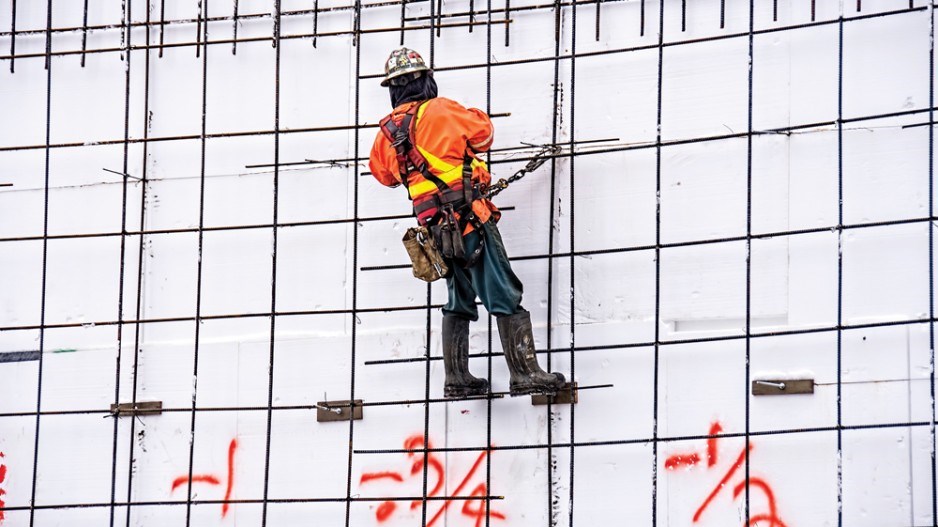Construction work is hard work and construction workers run the risk of injuries, diseases and fatalities.
These risks are exacerbated by long working hours, organizational pressures and substance use -– all of which are particularly problematic causes of workplace harms, according to an industry study published earlier this year.
Two B.C. construction organizations recently published studies of substance use that covered two different aspects of the problem: The impact on safety and the economic cost of the issue in the province, estimated to be hundreds of millions of dollars annually.
The BC Construction Safety Alliance (BCCSA) produced Construction Safety and Substance Use: Blueprint for Action in BC. The report was researched and written by scientists at the Centre for Applied Research in Mental Health and Addiction at Simon Fraser University (SFU).
The authors say the report addresses gaps in our understanding of alcohol and other drug use in B.C.’s construction industry: Most research has been done in the U.S., yielding results that don’t always apply to Canada, and Canadian studies are limited by small sample sizes or a focus on single organizations.
Operating in consultation with the BCCSA board, the researchers developed an online employee survey and an interview script for 35 “key informants” – safety officers and supervisors, union and management officials, association representatives, insurers and employers from workplaces across B.C.
A total of 639 individuals responded to the survey.
“It’s the most comprehensive investigation of substance use and its implications for safety in a large regional construction sector,” said Julian Somers, an SFU health sciences professor and one of the report’s authors. “According to the results, cannabis and alcohol account for the vast majority of safety and health-related risks faced by workers in B.C. construction.”
Most of the substances respondents reported using in the past 12 months were alcohol (82 per cent), cannabis (42 per cent), tobacco (31 per cent), mushrooms/LSD (16 per cent) and cocaine (nine per cent). Use of the opioids fentanyl and heroin was less than one per cent.
The report made a number of recommendations for minimizing risk and promoting wellness in construction.
Among them was a shift away from a drinking culture and the promotion of professionalization and the benefits of certification.
“The B.C. construction sector is characterized by increasingly robust standards of certification and a high level of formal education. Norms related to alcohol and other drug use in other safety-sensitive fields (e.g., airlines, medicine) illustrate standards and practices that may be useful to emulate and disseminate within the B.C. construction sector, consistent with the evolution of professionalism,” the report noted.
Mike McKenna, BCCSA executive director, said the industry’s biggest challenge is to get people in construction to change their behaviour.
“Construction culture needs to change; that’s the heart of the matter,” said McKenna. “Most workers feel they have no control over their work lives. There’s no certainty. They finish one job and then wait to start the next. Workers need to be treated like the valuable resources they are.”
Vicky Waldron, executive director of the non-profit Construction Industry Rehabilitation Plan (CIRP), says she is pleased that construction is now taking substance use and mental health seriously.
“It used to ignore them, so it’s a step in the right direction,” said Waldron.
CIRP recently published a report called Estimation of the Economic Impact of Substance Use and the Related Mental Health Issues on the BC Construction Industry.
The study, which was undertaken by Prioritize Consulting Ltd. in Vancouver, calculated an estimate of the annual economic impact of substance use and related mental health issues on the construction industry.
The authors say both have an economic impact on construction in two ways: Days of work missed, and days of work when a worker was present but hungover or going through withdrawal and unable to work at full capacity.
The researchers surveyed construction employees by email and text with messages that described the survey and its purpose, and provided a link to the survey, which could be completed anonymously in less than three minutes. After crunching the numbers, the researchers estimated the total annual cost to the industry from employees missing work and showing up hungover or with withdrawal symptoms to be $847 million. The cost to the B.C. government in taxes foregone was estimated to be $318 million.
Whatever their causes, symptoms and economic costs, substance use and their attendant mental health problems are not unique to the construction industry, says Chris Atchison, president of the BC Construction Association.
“It’s a problem with men between 25 and 45 in any occupation,” he said. “That overlaps with construction, where 95 per cent of the workers are men and most of them are also 25 to 45. It’s a demographic and societal problem.”




